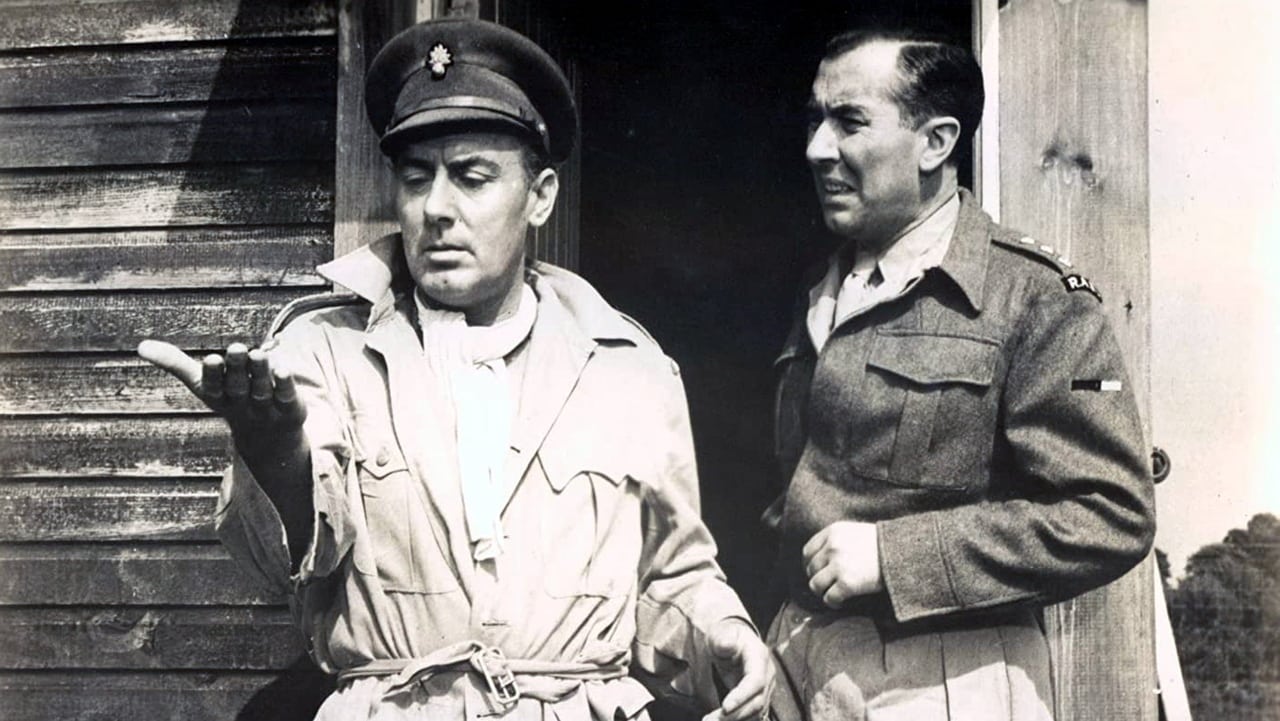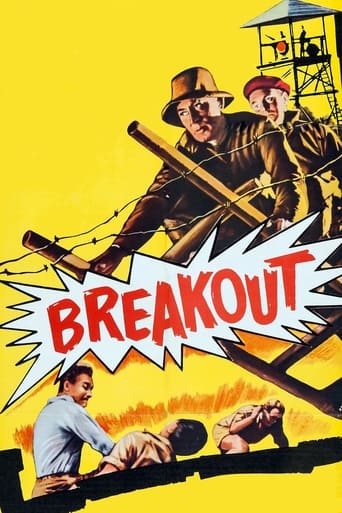Hellen
I like the storyline of this show,it attract me so much
Ogosmith
Each character in this movie — down to the smallest one — is an individual rather than a type, prone to spontaneous changes of mood and sometimes amusing outbursts of pettiness or ill humor.
Rio Hayward
All of these films share one commonality, that being a kind of emotional center that humanizes a cast of monsters.
Cristal
The movie really just wants to entertain people.
James Hitchcock
Films about prisoner of war camps ("The Wooden Horse", "The Colditz Story", "Stalag 17", "Bridge on the River Kwai", "King Rat") were popular in both the American and British cinemas during the fifties and sixties, and "Danger Within" is another in this tradition. The film is set in a POW camp in Northern Italy during the summer of 1943, a camp which houses British, French and other Allied captives. The British officers come up with a number of ingenious escape plans, but the Italians succeed in foiling them all, and many inmates begin to suspect that there is an informer in their ranks. The prime candidate is a Greek officer, Lieutenant Coutoules, and when he is found murdered there is no shortage of suspects.The film is unusual in that the captors are Italian rather than German or Japanese. In British and American war films of this period (and occasionally in films made during the war itself, such as "Sahara"), Italians were generally portrayed in a sympathetic light, as unwilling partners in the Axis who had been dragged into the war by Mussolini's folly, but in this film they are the villains. (Their German allies only make a very brief appearance). Indeed, the main Italian character, Captain Benucci, is a vicious sadist, quite as brutal as any Nazi. In reality German and Italian guards were generally unwilling to shoot escaping prisoners if they could avoid it- in all the many attempted escapes from Colditz only one British prisoner was shot dead- but Benucci takes a psychopathic delight in gunning down escapers when he could quite easily capture them alive.The film stars a number of leading British actors of the period, including Richard Attenborough, Michael Wilding, Bernard Lee, Dennis Price and Richard Todd, who seemed to star in just about every British war film that didn't star John Mills or Kenneth More. Despite all the talent on display, however, the film is something of a disappointment. I think the main reason is that it introduces a number of serious themes and then fails to develop them properly. After the death of Coutoules it appears to be developing into an unusual murder mystery, but the mystery is quickly cleared up and well before the end of the film we learn the identity of the murderer and his motive. (It has already become apparent that the Greek was not the informer).We also learn who the real informer is, but the film misses the opportunity to examine his motives and the question of what might persuade a man to betray his country in this way. Another potentially interesting theme which is not explored is the division among the British officers between those who are keen to escape as soon as possible and those who prefer to sit out the war in the safety of the camp. The former regard the latter as dishonourable and the latter regard the former as foolhardy. These potentially interesting themes, however, are never explored properly, being subordinated to an implausible "Boy's Own" ending in which Benucci and the traitor get their come-uppance and the whole of the camp make a mass breakout under cover of watching a production of "Hamlet". Not, by any means, as good a film as it could have been. 5/10
no2-10
It's not too bad and has good pace, although from the comments already made I was expecting a little more. The cast list is nothing special - mostly second string names, bar Richard Attenborough, though Peter Arne manages a good turn as the commandant.But there was much glossing over the catastrophic mistakes they made - getting the wrong man, the continuing escape failures, and even when it's less than certain that the next plan will work, the British commander decides to opt for the most hare-brained plan of them all - insane!The potential 'whodunnit' surrounding why their plans keep failing is missed entirely, suggesting a low budget necessitating plot simplification, which was a pity. Plot holes a-plenty, badly filled in e.g. the late laundry van. Elements of better films could be seen here, but most of the actors seem all too fit and healthy for it to be anything more than a bit of fun, rather than a more serious attempt to portray the conditions in a POW camp.Indeed, the portly British commander (did he get stuck in that hole? - certainly looked like it!) once berates an officer for 'treating the place like a holiday camp'. Well, they're obviously well fed and bathed (enough spare water to clean up the dead man at the start), plenty to smoke, matches (!), candles, they have music, drama (with costume) and sports, sunbathing - why would you want to break out?? ;-)
john2win
Although similar but not as good as Stalag 17, this is one of the best British POW movies. The script is fast paced, the cast is excellent, the acting is top draw , without hamming it up. And like Stalag 17 there is a traitor in the camp. The film blends drama with a good whodunit, and throw in the Camp's production of Hamlet as a ploy to enable a mass escape is an absolute joy. Dennis Price, Bernard Lee,Richard Todd, Peter Arne and a who's who of British actor's make this such an enjoyable film. Richard Attenborough's performance as always is superb. I rate this film and recommend it to anyone who enjoys War-Drama movies. Danger Within is being shown on Channel Four on Tuesday afternoon 12th of July, please watch it, if i had a VCR i would record it!. This film deserves a quality DVD release in it's original aspect ratio, so whoever own's the rights please do something about it.
Alice Liddel
A rare bright spot in a benighted genre, this British POW drama avoids familiarity not only by avoiding stiff upper lip and grey morality in favour of wit, tension and Hollywood stereotype, but also by a clever use of the metaphors of theatre. Most British war films parade their stifling docudrama-style 'realism'; this is often an excuse for imaginative paucity. 'Danger Within' uses the idea of play to question some of the received myths about the British Second World War.Part of the novelty lies in its North Italian setting - we're so used to nefarious Nazis and brutal Japanese. Not that it makes much difference - the main villain, Capitano Benucci, is a Nazi-trained sadist, who imagines he's suavity incarnate with his sophisticated cigars, laidback walk, time goatie, and clipped, ironical speech. But the blanching sun makes a nice change, giving a parched, sandy feel, and the notorious stereotype of Italian incompetence makes the various plot points believable.What makes this narrative absorbing is not the usual will-they-or-won't-they escape plot, but a kind of detective story. No matter how ingenious the efforts of the escape committee - and there is a brilliant one here involving sewers, light-switches, misplaced cigarettes and rugby posts- there is always the same welcoming committee of armed fascists ready to mow them down. It's clear there's an informer, but who?The obvious culprit is a shifty-looking Greek. This is the film's first daring piece of iconoclasm. There is a lot of anti-Italian racism throughout, but that can be attributed to understandable wartime emotionalism, where contempt for what Fascism stands for is expressed in xenophobia. But the Greek's only obvious credentials for being an informer is the fact of being a Greek, a little small, sweaty, oily, you know, naturally sneaky. When his name is called at roll-call, a wit hurls a dead rat at the officer; we remember Nazi anti-Semitic propaganda that used similar analogies.This is a strangely unideological war these men are fighting - there is no rhetoric about liberty and democracy; this is a prison film in which the criminals, all professionals, want to escape. Everything centres on the job in hand, with loyalty vouchsafed for anyone who agrees. This lack of sentimentality is refreshing an a genre stuffed with secular piety.Even better is the working of the theatrical metaphors. The brilliant opening scene features a prisoner disguised as the commandant - their fatal meeting creates a mirror effect that echoes in the following narrative about, not only duplicity, but also people who don't seem to be what they are, including old fops who turn out to be very brave men. Of course, this is a situation where the Law are murderous criminals, and the prisoners are democratic saviours, ambiguous enough in itself. It creates a world where you don't know who to trust, especially dangerous in a situation where loyalty and trust need to be givens. This idea of acting and pretending (extending to the Capitano) culminates in the attempted escape during 'Hamlet', with the immortal Dennis Price in a mop wig as the Prince. It's a shame they couldn't have picked a more apposite play - King Lear, perhaps? - or worked it in better, with a play-within-a-play scene, for instance, to reveal the murderer. But that would have been silly, contrived, arty, and no British war film would ever be that. Michael Wilding is a bizarre sight in this testosterone heavy atmosphere; even more surprising is how excellent he is with his old queen patter and reserves of steel.

